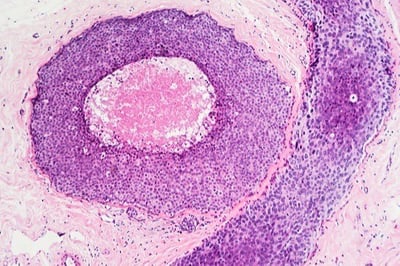All XRAYs



Relevance: Medium-High
Most relevant for: Post-menopausal women with no breast cancer diagnosis
Study: A low-fat diet may decrease postmenopausal breast cancer deaths
Research reported at the 2019 annual meeting of the American Society of Clinical Oncology establishes a link between dietary fat intake and its impact on postmenopausal women’s risk of dying from breast cancer. (6/13/19)
READ MORE ›


Relevance: Medium-High
Most relevant for: Young women of color with a BRCA mutation
Personal Story: A young woman's story of genetic testing and risk-reducing mastectomy
Alejandra Campoverdi comes from a family with three generations of breast cancer. As a former White House aide and active educator in the Latina community, she has openly shared her story of genetic testing, her BRCA2 mutation and her plans for risk-reducing mastectomy at age 39. (6/6/19)
Este artículo está disponible en español.
READ MORE ›


Relevance: High
Most relevant for: People with metastatic, triple-negative breast cancer
Guideline: FDA approves an immunotherapy treatment for some patients with triple-negative breast cancer
THIS INFORMATION HAS BEEN UPDATED: In August 2021 Roche voluntarily withdrew their FDA accelerated approval for Tecentriq (atezolizumab) in combination with chemotherapy (Abraxane®, albumin-bound paclitaxel; nab-paclitaxel) for the treatment of adults with unresectable locally advanced or metastatic triple-negative breast cancer (mTNBC) whose tumours express PD-L1.
The FDA approved the use of the immunotherapy drug atezolizumab (Tecentriq) in combination with the chemotherapy agent nab-paclitaxel (Abraxane) for certain patients with advanced triple-negative breast cancer. (5/26/19)
READ MORE ›


Relevance: Medium-High
Most relevant for: High risk women with a BRCA1 or BRCA2 mutation
Study: Do Vitamin B supplements alter breast cancer risk for women with BRCA mutations?
Vitamins are an essential part of our diet. Vitamin supplements are often used to improve general health. This study explores how vitamin B supplements may affect breast cancer risk in women with BRCA mutations. (5/17/19)
READ MORE ›


Relevance: Medium-High
Most relevant for: People with metastatic, triple-negative breast cancer
Study: Smart drug shows promising results for treatment of metastatic triple-negative breast cancer
THIS INFORMATION HAS BEEN UPDATED on 04/27/20: Based on the results from the study reviewed in this XRAY, the U.S. Food and Drug Administration (FDA) has approved sacituzumab govitecan-hizy (Trodelvy), as a treatment for people with metastatic triple-negative breast cancer who have received at least two prior therapies for metastatic disease.
We report results of an early-stage clinical trial of a new class of drugs for metastatic triple-negative breast cancer (TNBC). IMMU-132 is a combination of two different molecules: an antibody that targets certain types of cancer and delivers a chemotherapy drug that can kill cancer cells. This study looks at whether IMMU-132 is safe and effective for treating metastatic TNBC. (4/16/19)
READ MORE ›


Relevance: Medium-High
Most relevant for: Anyone diagnosed with breast cancer
Guideline: Breast surgeons recommend genetic testing for all breast cancer patients
The American Society of Breast Surgeons published statement on genetic testing for hereditary breast cancer on February 10, 2019. It includes recommendations about who should be tested. Among these is the recommendation that all breast cancer patients get genetic testing, as well as women who do not have breast cancer but fit the National Comprehensive Cancer Network (NCCN) guidelines. (3/25/19)
READ MORE ›


Relevance: High
Most relevant for: African American women who are at high risk for breast cancer
Study: Gaps in information about breast cancer risk and prevention impact African American women
A study showed that African American women with increased breast cancer risk experienced greater burdens in obtaining information at each step compared to white women. Racial differences in preventive choices correlated with differences in information and provider access. (3/14/19)
READ MORE ›


Relevance: Medium-High
Most relevant for: Bahamanian women
Study: Prevalence of BRCA founder mutations in Bahamian women
The Bahamas has the highest known frequency of BRCA mutations among people diagnosed with breast cancer. This study reviewed whether population-based BRCA testing (testing everyone regardless of family or personal history of cancer) would be an effective approach for finding mutation carriers in the Bahamas. (3/4/19)
READ MORE ›


Relevance: Medium-Low
Most relevant for: Women with or considering breast implant reconstruction
Study: Breast cancer implant study suggests links with illness but has serious flaws
THIS INFORMATION HAS BEEN UPDATED: In October 2021, the FDA issued guidance for people with breast implants Read our latest review on this topic.
An article in the Annals of Surgery, researchers conclude that their work supports an association between silicone breast implants and a range of conditions. This journal article was accompanied by two editorials in which experts voiced their disagreement with the way the analysis was performed and the conclusions of the authors. (2/21/19)
READ MORE ›


Relevance: Low
Most relevant for: People diagnosed with cancer
Article: Promise of a cure for cancer is too good to be true
The Jerusalem Post published an article titled, “A cure for cancer? Israeli scientists may have found one.” The story profiled a small Israeli company called Accelerated Evolution Biotechnologies that has been working on developing new cancer treatments since 2000. The article relied almost entirely on an interview with the company’s chairperson of the board who made a series of unsubstantiated claims that included that, in a year’s time, the company will offer a complete cure for cancer. (2/12/19)
READ MORE ›